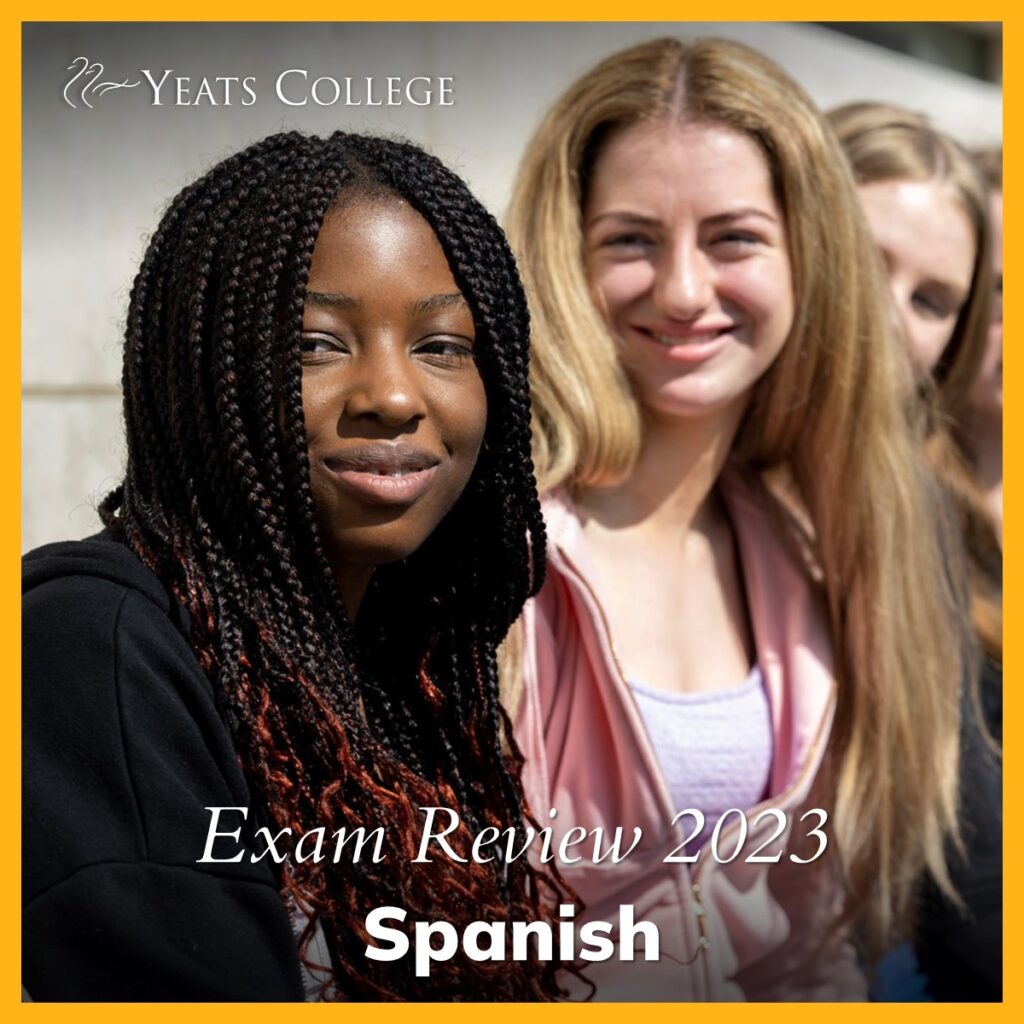By Dr Eoin Barrett
The 2023 Leaving Certificate Spanish Higher Level paper was considered interesting, accessible and generally fair, though a number of students commented that the Listening contained some tricky elements when compared with previous years’ papers.
In Section A, the Prescribed Literature option on Gabriel García Márquez’s Relato de un náufrago should have been straightforward for well-prepared students. The passage selected describes a key scene in which Luis Alejandro Velasco finally reaches land after ten days adrift on a life raft. The related questions were accessible and consistent with last year’s paper in terms of style.
This year’s ‘Journalistic Text’ charted the worrying increase in the frequency and intensity of heat waves in Spain, and the consequent efforts to establish refugios climáticos (climate refuges), where members of the public can go to escape the uncomfortable and often dangerous effects of these extreme weather events.
Question 1 (a-e) was quite straightforward, given that the key words in the questions provided good guidance to candidates in terms of identifying the passages that contained the relevant answers, though it wasn’t always obvious how much detail would be required for full marks, in particular for 1 (a) “What changes have Spaniards made to combat the intense heat?” However, well-prepared students would have known to include all detail that may have been relevant to the answer.
Question 2 should have been manageable for most students, though as usual they needed to be careful to ensure that there were no extra words, or missing words, when identifying the equivalent passages in the text:
(a) ciudadanos – habitantes
(b) es posible relajarse – se puede descansar
(c) altera la conducta – modifica el comportamiento
In Question 3, it was important that students provided the English equivalent to the phrases indicated by referring back to the article for context. The passages chosen were not especially difficult, though the phrases “a tope” (to the maximum/at full blast) “la raza humana” (the human race) and “su entorno” (its/their surroundings/environment) may have looked tricky at first glance.
Question 4 offered two short, accessible options to paraphrase in Spanish: ‘una estadística muy grave’ and ‘un gran número de centros escolares’. Both phrases were similar to language that featured in previous years’ papers and should not have posed difficulties for the majority of students.
The Section A short comprehension questions were accessible, and indeed quite humorous in places.
The first highlighted the case of Marcelo Paredes, an Argentinian thief who decided to abandon his life of crime, and even compensate his victims, after winning nearly a million pesos in the lottery.
The second short comprehension focused on the fashion chain Zara’s decision to launch a clothing collection for pets. Both of these short texts were relatively easy to understand, though they did require students to know some specific vocabulary related to jewellery and clothing.
The Section B long comprehension task highlighted the fact that on average Spanish people take longer to move out of home and achieve independence than the majority of their European counterparts, and explored some of the factors that contributed to this phenomenon.
Questions 1 and 3, which require students to find words or phrases in the text equivalent to those provided in the question, were very approachable this year, featuring vocabulary that should have been familiar to students from previous years’ papers, and indeed from their preparations for the Oral Exam. As always, students had to ensure that they only included the exact equivalent word or phrase to gain the marks.
1.
(a) en el medio – a la mitad
(b) quehaceres domésticos – tareas del hogar
(c) admite – reconoce
(d) bastante – suficiente
(e) periodos difíciles – tiempos adversos
3.
(a) por el contrario – sin embargo
(b) murió – falleció
(c) cambiarme – mudarme
(d) normal – natural
(e) indica – señala
The phrases to be translated in Q.2 were nice and straightforward this year:
2.
(a) El alto coste del alquiler suele ser otro gran obstáculo…
The high cost of rent is usually another big obstacle/barrier
(b) … la fuerte conexión familiar que caracteriza a los españoles.
… the strong family connection that is typical of/characterises the Spanish.
(c) Educan a los niños para ser autosuficientes y establecer su propia casa.
They educate their children to be self-sufficient and establish/set up their own homes.
Students should also have done well in Q. 4, though for parts (b) and (c) it appears that there weren’t as many relevant details required as in some previous years.
The Opinion Piece titles were as follows:
(a) No hay nada tan importante como la familia
There is nothing as important as family
(b) Ser estudiante en Irlanda es muy caro
Being a student in Ireland is very expensive
(c) Hoy día los jóvenes tienen una vida muy fácil
Nowadays young people have a very easy life
These titles were clear and easy to understand, and offered students plenty of choice and scope for expression. These essay titles once again highlighted the need for students to develop their writing skills so that they can brainstorm and develop arguments in exam conditions, rather than attempting to have a few essays memorised in the hope of fitting one of them to the title.
Section C
In Section C, the Dialogue Construction involved a conversation with the coach of a local basketball club in Madrid about joining the club. Most of the vocabulary required should have been familiar to students from their preparations for the Orals and previous years’ exam tasks.
Once again, there were no subjunctives required in this year’s Dialogue, but candidates needed to pay very careful attention to the various verb tenses required for full marks (Present, Preterite, Imperfect, Present Perfect, Conditional and Future) as well as certain grammatical constructions, especially Verbs like Gustar (ex. “you would like to stay fit”, “they love the sport”, “you don’t mind training”, “your parents love basketball”.
The Letter/Email option related to the advantages of Spanish people coming to Ireland to improve their English, perhaps a veiled reference to the fact that it is now a much better choice than Britain in a post-Brexit Europe. The elements of choice provided made this task approachable, though overall I feel it was still more difficult than the Dialogue Construction option this year
The Diary Entry invited the candidate to imagine they had just spent a month travelling around Spain on their own. As with previous years, this task should not have posed difficulties for students who had plenty of practice with previous years’ tasks, and who had revised the sample answers provided. The only potential difficulty might have been Turn 2, “Mention one advantage of travelling alone”, though students had the option of discarding one turn this year and hence could have avoided this slight difficulty.
The Note option asked students to imagine they were staying with a friend in Bilbao, and was on a par with the Diary Entry in terms of difficulty this year. Most of the vocabulary would have been familiar from students’ Oral exam preparations, though as always students had to be sharp on the need to use present, past and future forms appropriately for full marks.
The Listening test was varied in terms of the topics examined, and was perhaps a bit trickier in places than some previous years, but should still have been accessible for students who had a broad range of vocabulary, and who got plenty of practice with past and mock papers in the run-up to the exam.
The paper featured an ad for an agency which assists people seeking to move to Spain, interviews with the Argentine-born Queen Máxima of Holland and the adventurer Javier Martínez, descriptions of the Seat motor company and traditional Mexican food, plus a news item about the secret of love told through the story of Julio and Meena, a couple from Quito, Ecuador who have been married for a Guinness record-breaking 79 years. The weather question did not throw up any major difficulties, but required a bit more detail for full marks than in some previous years
All in all, Yeats students should have been very happy with the 2023 Spanish Higher Level exam, and should rest easy now and enjoy the summer knowing that their work is done.





